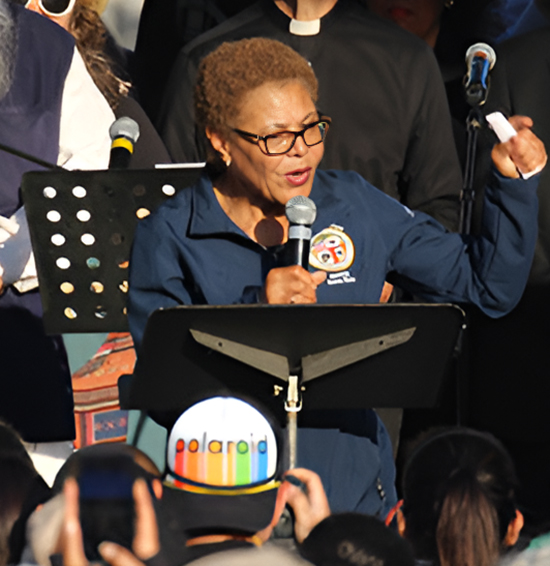Ruling puts more L.A. immigrants at risk: Bass

Mayor Karen Bass addresses a group of immigrant advocates at a news conference in June. Bass was highly critical of a U.S. Supreme Court ruling Sept. 8 that will allow immigration raids to resume in the Los Angeles area.
File photo
By Ray Richardson
Contributing Writer
LOS ANGELES — The rising number of Black immigrants in California is renewing deportation and harassment concerns after a Supreme Court ruling on Sept. 8 allowed Immigration and Customs Enforcement agents to continue using racial profiling to pursue suspected undocumented persons living in the state.
A study released last week by the Black Alliance for Just Immigration revealed that of the 2.8 million Blacks residing in California, 8%, approximately 218,000, are immigrants from such countries as Nigeria, Ethiopia, Belize, Jamaica, Haiti, Kenya and other nations with majority populations of people of color.
The study also showed that nearly one in four Black Californians is an immigrant or the child of immigrants, underscoring the importance of addressing anti-Black racism in immigration policy. From undocumented students navigating higher education, to health care access denied through language discrimination, the challenges are urgent and systemic.
“This report gives statistical weight to the living realities of our people,” Nana Gyamfi, executive director of the alliance, said in a statement. “Black immigrants are leaders, workers, parents, students and caregivers.”
With the number of Black immigrants in California increasing, civic and community leaders in the Los Angeles area are sounding the alarm again to be cautious and vigilant in response to ICE activities.
ICE operations had slowed since a federal judge in San Francisco ruled in June that the agency’s tactics were illegal and violated civil rights statutes and constitutional protections. The Supreme Court decision overturned the ruling, paving the way for ICE agents, under the direction of the Trump administration, to resume their controversial pursuits of suspected undocumented immigrants.
The Supreme Court ruling drew an angry response from Mayor Karen Bass, who vowed to continue supporting the rights of immigrants living in the Los Angeles area and surrounding communities.
“The highest court in the country ruled that the White House and masked federal agents can racially profile Angelenos with no due process, snatch them off the street with no evidence or warrant, and take them away with no explanation,” Bass said in response to the ruling. “This decision will lead to more working families being torn apart and more fear of the very institutions meant to protect — not persecute — our people.”
Gov. Gavin Newsom also blasted the ruling.
“Trump’s hand-picked Supreme Court majority just became the grand marshal for a parade of racial terror in Los Angeles, Newsom said. “This isn’t about enforcing immigration laws — it’s about targeting Latinos and anyone who doesn’t look or sound like Stephen Miller’s idea of an American, including U.S. citizens and children, to deliberately harm California’s families and small businesses.
“Trump’s private police force now has a green light to come after your family — and every person is now a target — but we will continue fighting these abhorrent attacks on Californians.”
Since the immigration raids began in June in major cities around the country, Trump administration officials have claimed that the intent was to seek out the “worst of the worst,” an apparent reference to immigrants in the United States believed to be criminals.
The Supreme Court’s decision Sept. 8 stemmed from a lawsuit filed in early July in which Southern California residents, workers and advocacy groups accused the U.S. Department of Homeland Security of “abducting and disappearing” community members using unlawful stop and warrantless arrest tactics and confining individuals at a federal building in illegal conditions while denying them access to attorneys.
Lead plaintiff Pedro Vasquez Perdomo, 54, a day laborer from Pasadena, says he was waiting to be picked up for a construction job at a bus stop in front of a Winchell’s Donuts in Pasadena on the morning of June 18 when he and two others were surrounded by masked men with guns, arrested and taken to a detention center in Los Angeles, where he remained for three weeks. He has since been granted bond and released.
The men who took Vasquez Perdomo never identified themselves to the plaintiffs, never stated they were immigration officers authorized to make arrests, never stated that they had arrest warrants and never informed the plaintiffs of the basis for their arrests, the lawsuit alleges.
“When ICE grabbed me, they never showed a warrant or explained why,” he said in response to the ruling. “I was treated like I didn’t matter — locked up, cold, hungry, and without a lawyer. Now, the Supreme Court says that’s OK? That’s not justice. That’s racism with a badge. I joined this case because what happened to me is happening to others everyday just for being brown, speaking Spanish, or standing on a corner looking for work. The system failed us today, but I’m not staying silent. We’ll keep fighting because our lives are important.”
Speaking on the results of the Black Alliance for Just Immigration study, Gyamfi was specific in addressing how researchers came across Black immigrants who are “leaders, workers, parents, students and caregivers.”
The study also revealed that 57% of Black immigrants in California, ages 25–64, hold an associate degree or higher.
“Our complaint numbers have gone up,” said Capri Maddox, executive director of the Los Angeles Department of Civil and Human Rights. “We have received many calls from Black immigrants concerned about ICE raids. The Supreme Court ruling may be connected more to Latino immigrants today, but we know how things can shift toward a disadvantage for African-Americans.:”
According to a study released by the Kaiser Family Foundation in 2020, 41% of African-Americans living in the United States feel they were stopped by police because of their race.
When ICE operations began in June, civic and community leaders warned Black immigrants and African-Americans to not dismiss the immigration raids as only a “Latino issue.”
“We’ve been saying if they come for one of us, they’ll be coming for all of us,” Maddox said. “People are really emboldened now to violate a person’s civil rights. A lot of the challenges we have fought a long time for have been undone.”
Based on the Black Alliance for Just Immigration study, California cities with the largest Black immigration populations include Los Angeles, San Diego, Oakland, San Jose, San Francisco, Sacramento, Inglewood, Moreno Valley, Long Beach, and Riverside.
Communities in the Los Angeles area have been targeted the most by ICE agents. A majority of those operations centered on profiling suspected undocumented Latino residents.
Bass indicated that the Supreme Court ruling will not stop her from supporting and protecting the rights of immigrants in Los Angeles.
“Let me be clear,” Bass said. “We will not allow the White House, nor the Supreme Court, to divide us. And to all Angelenos, I will never stop fighting for your rights, your dignity, and your safety, despite this administration’s efforts to threaten them. We will stand united.”
Ray Richardson is a contributing writer for The Wave. He can be reached at rayrich55@gmail.com.





